How to Become an SEO Expert (8 Steps)
Looking to become an SEO expert but have no clue where to begin?
With demand for SEO professionals higher than ever and average hourly rates sitting between $75-$150, there’s a clear financial incentive to get good at SEO.
But with no colleges offering degrees in SEO, it’s up to you to carve your own path in the industry.
In this guide, you’ll learn how to break into the field and kickstart your journey to becoming an SEO expert in 8 simple steps.
What do we really mean by “SEO expert”?
Expert is a relative term. You might see me as an SEO expert, but someone with more experience like Rand Fishkin almost certainly wouldn’t.
No matter how much you learn about SEO, there’ll always be someone that knows more.
For that reason, your goal shouldn’t be to become an SEO expert per se. It should be to learn enough to get results consistently.
8 steps to become an SEO expert
Follow this simple process to go from SEO newbie to SEO pro.
- Learn how search engines work;
- Understand the three key ranking factors;
- Master the four main buckets of SEO;
- Start a website;
- Niche down;
- Create systems and delegate;
- Never stop learning;
- Be patient
Google’s index contains trillions of web pages, which is built primarily from crawling the web.
When you type a query into Google, it pulls all matching pages.
Because there are often millions of relevant results, Google’s algorithm then ranks them based on hundreds of factors. Nobody knows what all of these factors are or how they’re weighted, but we do know some.
Sidenote.
SEO only influences the so-called organic results. It doesn’t affect paid ads.
Learn more about those factors in this post.
Lots of people get bogged down optimizing for ranking factors that aren’t all that important. So before you start obsessing over pagespeed or title tags, make sure you’re on top of the three big ones.
Relevance
This is how well your page matches the query.
If someone types “how to make lavender oil” into Google, then Google won’t return pages about cars because that’s irrelevant.
But relevance goes deeper than that. Your page also needs to match the type of content people want to see.
For example, a person searching “how to make lavender oil” wants a tutorial. They’re not looking to buy ready-made lavender oil. That’s why all of the results on the first page are blog posts, not product pages.
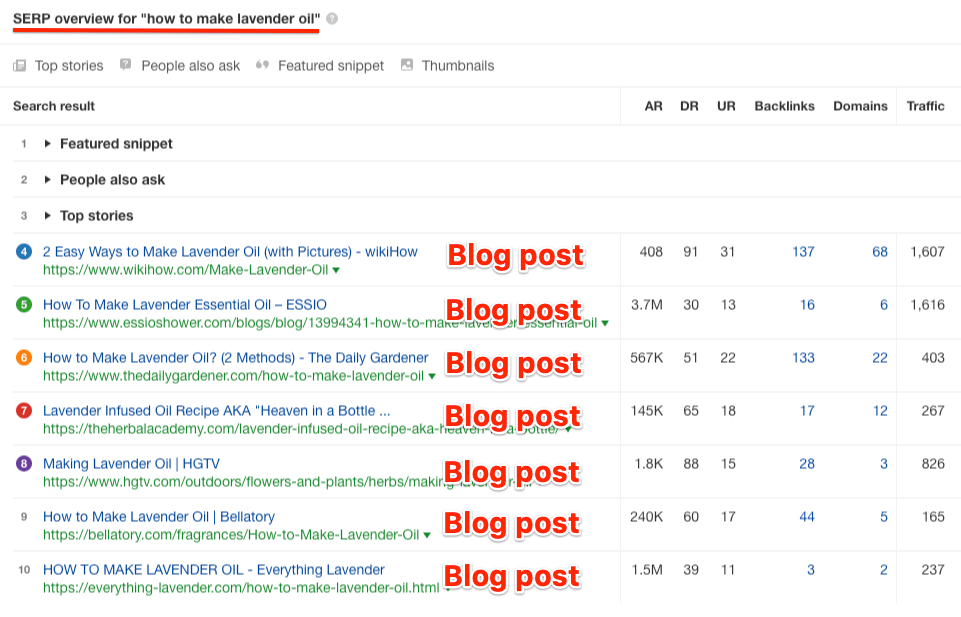
Catering to the “why” behind a query is known as optimizing for search intent.
Authority
This largely boils down to backlinks.
Google sees links as votes of confidence. The more high-quality backlinks you have, the higher you’re likely to rank.
The best backlinks have two key attributes: authority and relevance.
- Authority relates to the power of the linking website and web page. At Ahrefs, we have two metrics for measuring this: Domain Rating and URL Rating. The most powerful links are those from high-UR pages.
- Relevance relates to the topic of the linking website and web page. For example, if a post about making lavender oil has two backlinks, one from a tech blog and one from a health website, the one from the health site is probably more relevant. However, page-level relevance also matters. If the linking page on the tech website is about a relevant topic like the best smart diffusers, and the one on the health website is about an unrelated topic like bodybuilding, then the link from the tech website may be more relevant.
Utility
Google aims to show the best result in pole position. That means it isn’t enough just to match search intent. Your content needs to be the most deserving of the top spot.
But what constitutes quality and utility depends on the search query itself. So the best course of action is to review the current top-ranking pages and see what’s good about them, and where they fall short.
For example, this calculator works well on desktop but lacks utility for mobile visitors because it’s almost unusable on mobile: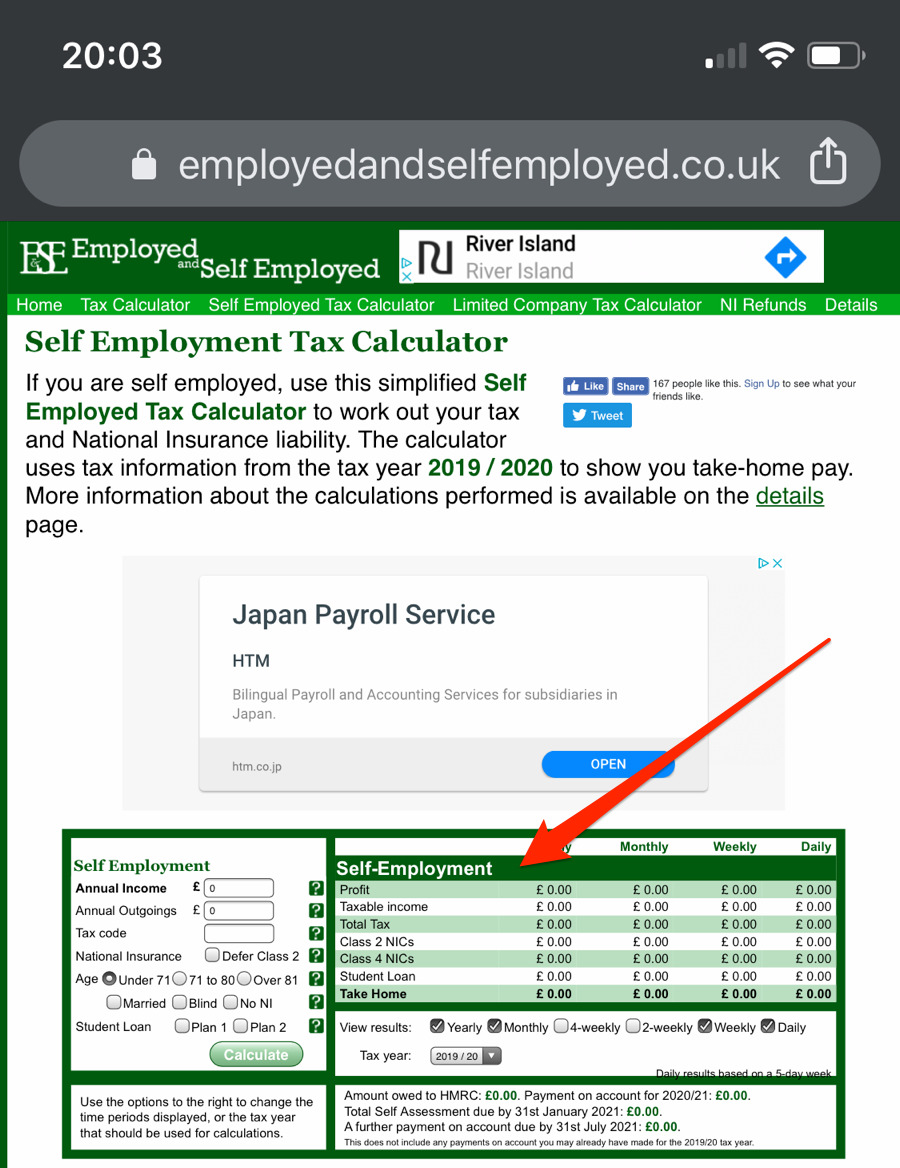
Think of SEO as a puzzle with multiple pieces. Understanding how they fit together is essential knowledge for any industry professional.
The four pieces are:
- Keyword research;
- On-page SEO;
- Link building;
- Technical SEO
Let’s go over what each of these entails.
Keyword research
Keyword research involves finding relevant words and phrases that people are typing into search engines like Google.
In general, you should target keywords that:
- Have “traffic potential” (i.e., are likely to send organic traffic your way should you rank for them);
- Have “business value” (i.e., are likely to attract potential customers);
- Aren’t too competitive
To find keywords that fit the bill, enter a few ideas into Ahrefs’ Keywords Explorer, and take a look at one of the keyword ideas reports.
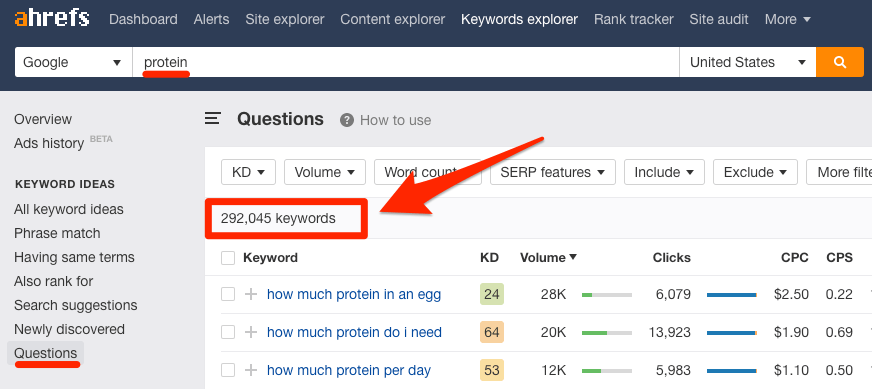
For each keyword, you’ll see a few important metrics:
- Search volume: the average number of people that search for the keyword each month;
- Keyword Difficulty (KD): the estimated difficulty of ranking on the first page of Google scored on a scale from 0–100;
- Clicks: the number of clicks on search results from that keyword each month.
The best keywords are those with high traffic potential (i.e., high search volume and clicks), high business value, and low ranking difficulty.
On-page SEO
On-page SEO is the practice of optimizing web pages to help improve rankings and attract more organic traffic from search engines.
Examples include:
- Optimizing for search intent;
- Using keyword modifiers in your title tags;
- Writing enticing meta titles and descriptions;
- Using descriptive alt tags for images;
- Internally linking to pages that you want to rank.
For more on on-page SEO strategies, check out this video:
https://www.youtube.com/watch?v=gDYjjkvtOVo
Link building
Link building is the process of acquiring new backlinks from third-party websites. They help improve rankings and boost organic traffic, but can also send referral traffic your way.
Check out some tried and tested link building tactics in these videos:
https://www.youtube.com/watch?v=3sF-m5LKCf4&list=PLvJ_dXFSpd2tjUTuAHpHidz5e2hAedP_m&index=2
Technical SEO
Technical SEO involves optimizing your website so that search engines can crawl and index your content efficiently, and visitors have a positive user experience.
Examples include:
Learn how to perform a basic technical SEO site audit in this video:
https://www.youtube.com/watch?v=oJPGa0J6p5Q
No matter how many books you read about golf, you’re never going to win a tournament without picking up a set of clubs and practicing.
The same rings true for SEO. You need to know the theory, but there’s no substitute for getting your hands dirty and actually ranking a site.
To start your own project, all you need to do is:
- Choose a topic you’re passionate about;
- Buy a domain and hosting;
- Put up a basic website;
- Start creating content
From there, it’s a case of putting your SEO knowledge into practice by optimizing your content, building some links, and making sure that your site is technically sound from an SEO perspective.
Nothing will teach you more about SEO than doing this.
That said, this obviously takes some time, and nothing takes more time than writing content. So, if you have the budget to do so, there’s no shame in outsourcing content. Just make sure to give your writer clear instructions so that what they produce is optimized for ranking.
Feeling tempted to take on clients?
Imagine that you’re a business owner looking to hire an SEO. Would you want to hire someone that hasn’t ranked a website in their life? Definitely not. For that reason, while you may be tempted to take on some freelance projects in the beginning, it’s unfair to put someone’s livelihood at risk just so you can practice and hone your craft.
If you want to speed up the learning process, get an entry-level position at a respected agency instead.
Jack of all trades, master of none.
That’s what you’ll be at the beginning of your SEO journey since you have to learn a bit about everything to have a solid foundation in the field.
However, you need to move past that over time.
Here are two ways to do that:
A. Master one specific skill within SEO
Because SEO is such a broad field, you won’t have time to become an expert at both link building and technical SEO. There’s so little overlap between the two that improving one skill doesn’t really improve the other.
Instead, you should become what’s known as a T‑shaped SEO expert.
Being a T‑shaped SEO expert means you have broad skills across all things SEO, but excel in one particular area.
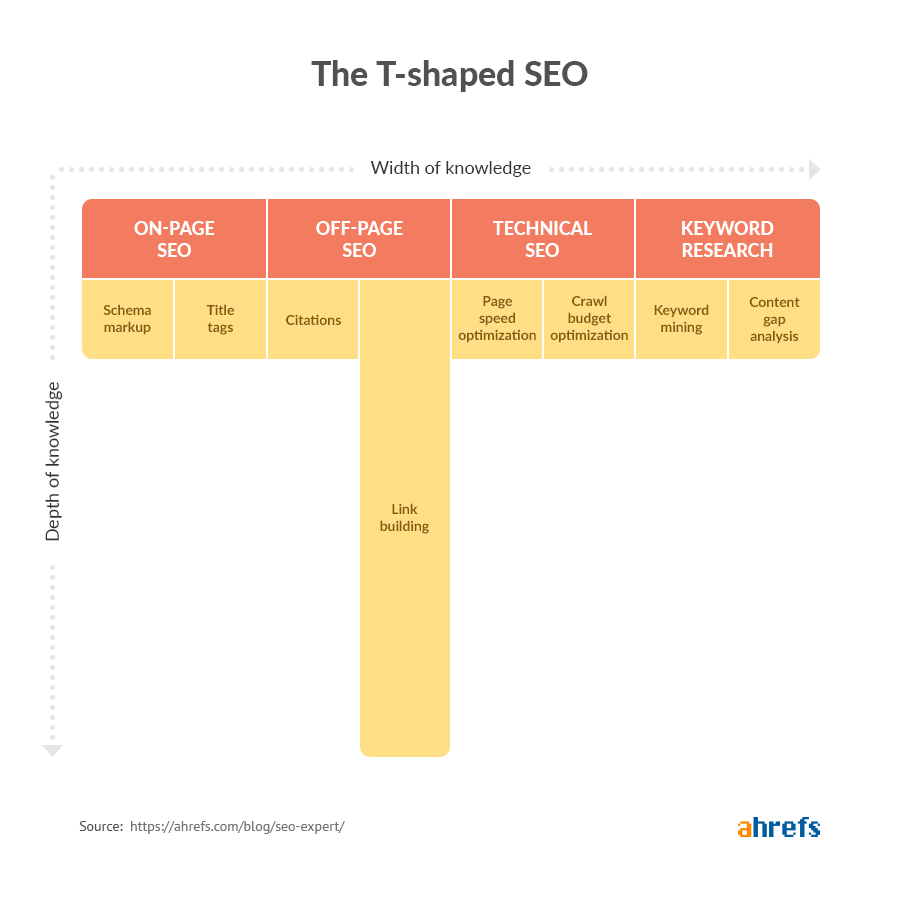
Marie Haynes is a fantastic example of a t‑shaped marketer. She specializes in Google penalty recovery and algorithm consultation. She doesn’t build links. She doesn’t do on-page SEO. She audits websites with traffic drops to find out what happened and helps business owners to rectify the situation.
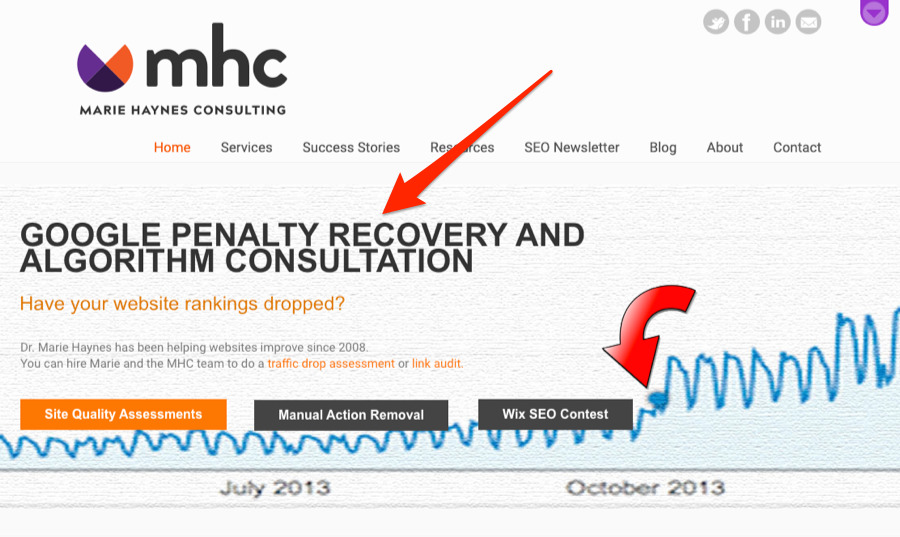
Seeker Digital, an agency specializing in outreach, is another good example.

B. Master SEO for one industry
Doing SEO for realtors requires a completely different approach to ecommerce SEO.
For the realtor, priorities might include setting up a Google My Business profile and getting listed on popular industry directories. For an online store, optimizing product and category pages is likely to be more important.
Becoming the go-to SEO expert for one type of business is a great way to refine your skills and client offering. It can also be extremely lucrative.
Case in point: This company does SEO for personal injury law firms and turns over in excess of $275,000/month—and that’s with just 15 employees:
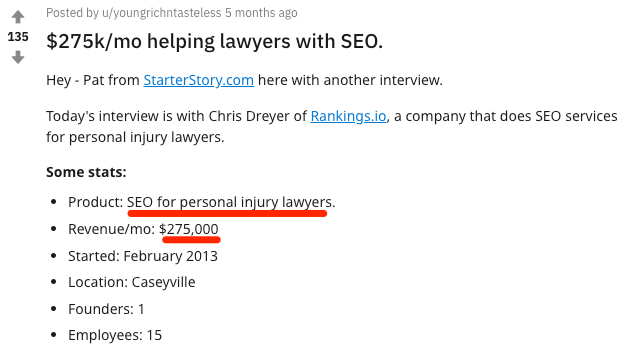
So while you could build a profitable business providing SEO services for all kinds of companies, it’s easier to hone your craft when you focus on one niche.
Just make sure that your chosen niche is both somewhat lucrative and interesting to you. For example, if you’re interested in real estate, you could provide SEO services for real estate companies. That’s a niche where money flows fairly freely, and companies are always looking for a leg up.
The more you learn about SEO, the more you’ll realize that there aren’t enough hours in the day to do everything yourself.
But even if there were, doing so would still be inefficient.
Being a “t‑shaped SEO expert” means that there are people who are better equipped to handle most SEO tasks than you. Delegating those tasks to the right people frees up your time to spend on the things you’re best at and most enjoy.
For example, if your expertise lies in keyword research and writing content that ranks, that’s how you should spend your time. You can bring on someone to handle tasks like link building and technical SEO.
Past saving time, your clients will get better service since they have highly-specialized people working on every aspect of their SEO.
However, more people means more moving parts, which can lead to things falling between the cracks.
Creating systems is the best way to keep everyone on the same page. This means creating SEO checklists (or SOPs) that you use on every project to keep things on track.
Here’s a system for generating a consistent stream of high-quality backlinks to get you started:
https://youtube.com/watch?v=Ovu2ZYWgOJQ
SEO moves fast. In 2018 alone, Google reported making over 3,200 algorithm updates.
Although many of these updates were relatively minor for users, it gives you a good idea of how fast “best practices” in SEO can change. That said, trying to keep on top of every tiny change Google makes is likely to be an effort in futility, so it’s better to stay focused on the fundamentals.
In other words, rather than chasing the algorithm changes, chase what the algorithm is trying to do: provide the best and most relevant content to users. That way, you won’t have to worry as much about updates and penalties.
Does that mean you shouldn’t network and follow experts to expand your opportunities and stay on top of valuable new strategies? Of course not. So here are some ways to do that:
Choose the ones that most appeal to you, but don’t go overboard. Follow the Pareto principle and spend 80% of your time doing and 20% of your time learning.
K Anders Ericsson famously theorized that it takes 10,000 hours of practice to master a new skill. Can it take less? Possibly. But the point is this: becoming an SEO expert is not an overnight process.
So, don’t feel bad if your content doesn’t reach the first page in the first couple of weeks.
That’s unlikely to happen, according to our research.
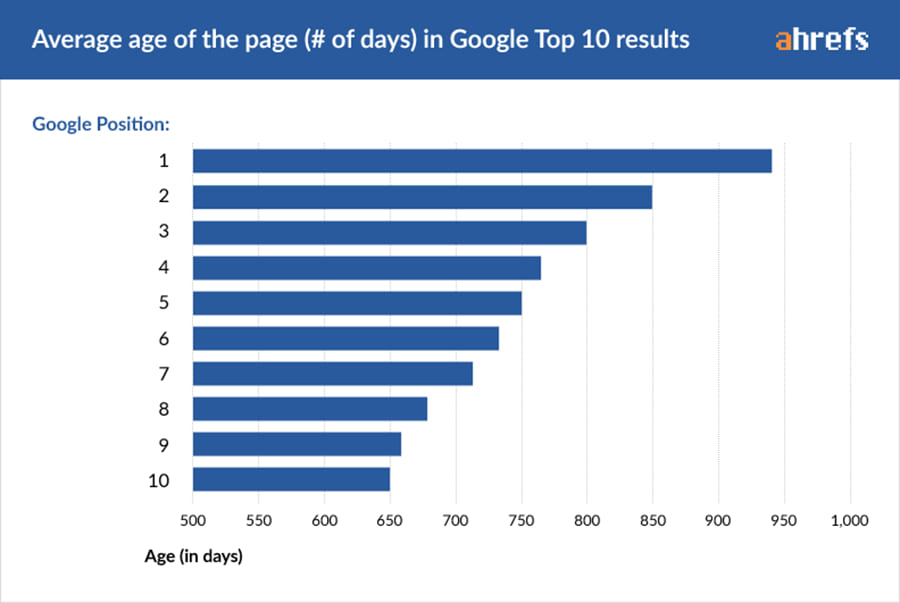
However, if you create good content, optimize your pages, follow keyword research best practices, and build enough high-quality links, your pages will eventually start to rank.
So keep grinding, retain your patience, and don’t give up.
Got questions? Hit me up in the comments or tweet me.
